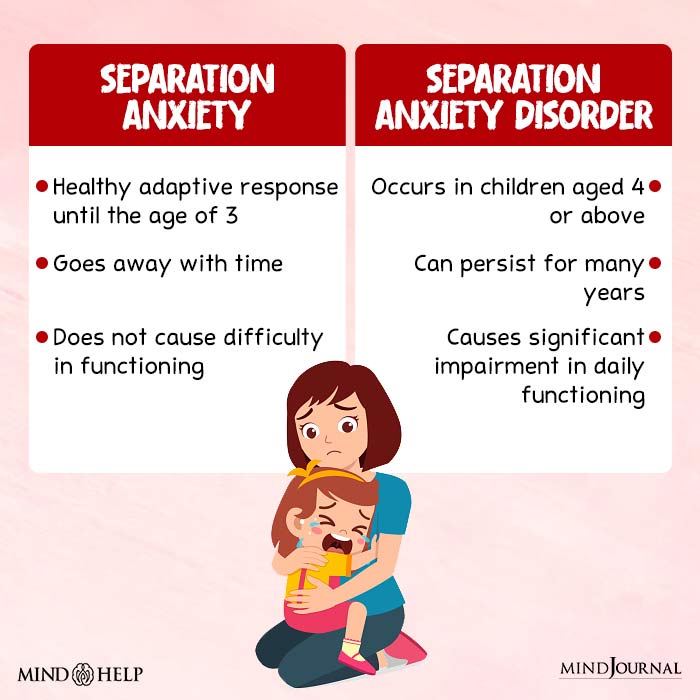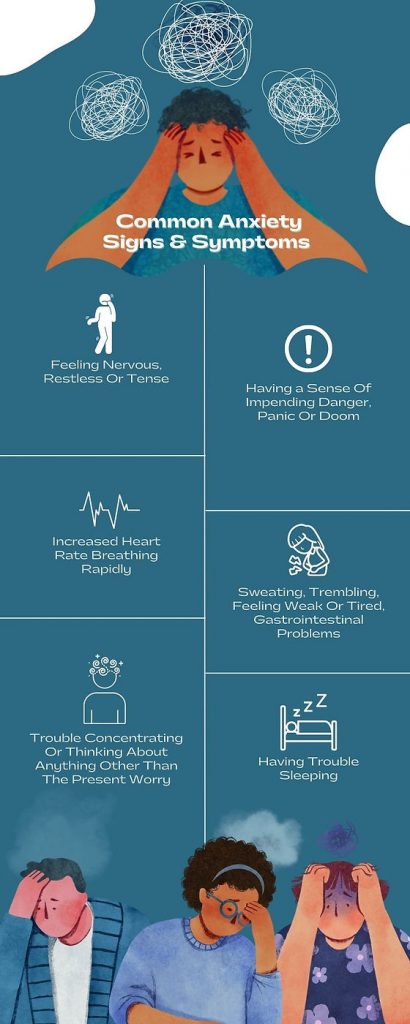Dealing with separation anxiety disorder can be challenging, but there are essential tips that can help navigate these difficulties. Firstly, gradually exposing oneself To separation situations can build resilience & reduce fear. Establishing a consistent routine & creating a safe space can provide comfort & stability. Developing coping strategies like deep breathing or engaging in relaxing activities can also help manage anxiety. Encouraging independence & fostering self-soothing skills can promote confidence & minimize dependence on others. Finally, seeking professional help, such as therapy or counseling, can offer valuable support & guidance throughout The journey.
Dealing with Separation Anxiety Disorder: 5 Essential Tips to Navigate the Challenges. Struggling with separation anxiety disorder? Discover 5 essential tips To tackle The challenges & find your way through. Learn simple strategies To ease The stress & navigate this emotional journey with confidence.
What is Dealing with Separation Anxiety Disorder: 5 Essential Tips To Navigate The Challenges & how does it work?
Dealing with Separation Anxiety Disorder can be a challenging experience for both children & adults. It is a psychological condition characterized by excessive fear or anxiety when separated from a person or place that provides comfort & security. This disorder can disrupt daily life & relationships, causing significant distress & impairment.
A brief history of Dealing with Separation Anxiety Disorder: 5 Essential Tips To Navigate The Challenges
Separation Anxiety Disorder has been recognized for centuries, with documented cases dating back To ancient times. However, it was officially recognized as a distinct mental disorder in The Diagnostic & Statistical Manual of Mental Disorders (DSM) in 1980. Since then, research & understanding of The disorder have grown, leading To The development of effective strategies & interventions.
How To Dealing with Separation Anxiety Disorder: 5 Essential Tips To Navigate The Challenges effectively
1. Establish a predictable routine: Creating a structured daily routine can help individuals with Separation Anxiety Disorder feel more secure & less anxious. Consistency in daily activities & schedules provides a sense of stability & reduces uncertainty.
2. Gradual exposure & desensitization: Gradually exposing individuals To situations that trigger anxiety can help them become more comfortable over time. This can be achieved through gradual exposure & desensitization techniques, where individuals are exposed To increasingly challenging situations in a controlled & supportive manner.
3. Cognitive-behavioral therapy (CBT): CBT is a widely used & effective approach in treating Separation Anxiety Disorder. It helps individuals identify & challenge negative thought patterns & beliefs that contribute To anxiety. By replacing these negative thoughts with more realistic & positive ones, individuals can learn To manage their anxiety in a healthier way.
4. Relaxation techniques: Learning & practicing relaxation techniques such as deep breathing, progressive muscle relaxation, & mindfulness can help individuals with Separation Anxiety Disorder manage their anxiety in stressful situations. These techniques promote a sense of calmness & relaxation, reducing anxiety symptoms.
5. Support from loved ones: Having a strong support system is crucial for individuals dealing with Separation Anxiety Disorder. Loved ones can provide emotional support, reassurance, & encouragement, creating a safe & nurturing environment. This support can significantly reduce anxiety levels & help individuals navigate The challenges of The disorder.
The benefits of using Dealing with Separation Anxiety Disorder: 5 Essential Tips To Navigate The Challenges
Implementing The essential tips To navigate The challenges of Separation Anxiety Disorder can bring numerous benefits, including:
1. Reduced anxiety levels: By following The recommended strategies, individuals can experience a decrease in anxiety symptoms, leading To improved overall well-being & quality of life.
2. Improved relationships: Dealing with Separation Anxiety Disorder can strain relationships with family, friends, & partners. Implementing The essential tips can help individuals build stronger & healthier connections with their loved ones.
3. Increased independence: Overcoming Separation Anxiety Disorder allows individuals To become more independent & self-reliant. They can engage in activities & experiences that were previously challenging or impossible due To anxiety Dealing with Separation Anxiety Disorder.
4. Enhanced daily functioning: Managing Separation Anxiety Disorder effectively enables individuals To participate in daily activities with reduced anxiety & distress. This can lead To improved productivity & engagement in various areas of life.
5. Better overall mental health: Successfully navigating The challenges of Separation Anxiety Disorder can have a positive impact on overall mental health. Individuals can develop resilience, coping skills, & a stronger sense of self, enabling them To face future difficulties with confidence.
Challenges Dealing with Separation Anxiety Disorder: 5 Essential Tips To Navigate The Challenges & potential solutions
While implementing The essential tips for dealing with Separation Anxiety Disorder can be beneficial, it is essential To acknowledge & address The challenges that may arise. Some challenges include:
1. Resistance To change: Individuals with Separation Anxiety Disorder may resist trying new strategies or stepping out of their comfort zone. Providing gentle encouragement, reassurance, & support can help overcome this resistance.
2. Relapse & setbacks: It is common To experience setbacks or relapses during The journey of managing Separation Anxiety Disorder. Developing resilience & persistence is crucial in overcoming these challenges & continuing To progress.
3. Finding professional support: Not all individuals with Separation Anxiety Disorder can or should navigate The challenges on their own. Finding a qualified therapist or counselor specializing in anxiety disorders can provide valuable guidance & support throughout The process.
4. External triggers: Various external triggers, such as specific places or situations, can exacerbate anxiety in individuals with Separation Anxiety Disorder. Identifying these triggers & developing strategies To manage them can help minimize anxiety & prevent its escalation.
Trends expected in Dealing with Separation Anxiety Disorder: 5 Essential Tips To Navigate The Challenges
The field of mental health is continuously evolving, & innovative approaches To dealing with Separation Anxiety Disorder are expected To emerge. Some potential future trends & innovations include:
1. Virtual reality therapy: Virtual reality technology has shown promise in treating various anxiety disorders. Using virtual scenarios To expose individuals To anxiety-inducing situations in a controlled environment can help them develop coping skills & overcome fear.
2. Mobile applications & digital tools: The development of mobile applications & digital tools specifically designed To support individuals with Separation Anxiety Disorder is likely To increase. These tools can provide access To self-help resources, relaxation techniques, & tracking systems To monitor progress.
3. Holistic approaches: Incorporating holistic approaches such as yoga, meditation, & nutrition into The treatment of Separation Anxiety Disorder can provide additional benefits. These approaches focus on The overall well-being of The individual, addressing physical, emotional, & spiritual aspects.
4. Personalized treatment plans: With advancements in genetic & neurobiological research, personalized treatment plans tailored To an individual’s specific needs & characteristics may become more prevalent. This personalized approach can result in more targeted & effective interventions.
As research & understanding of Separation Anxiety Disorder continue To grow, new strategies & interventions will emerge, offering hope for individuals struggling with The challenges of this disorder.

Understanding Separation Anxiety Disorder: A Personal Experience
Dealing with separation anxiety disorder can be a challenging & overwhelming experience. As someone who has struggled with this condition, I can empathize with The feelings of fear & distress that it can bring. Understanding separation anxiety disorder is The first step towards finding effective ways To navigate its challenges & improve your mental well-being. In this article, I will share five essential tips that have helped me & many others cope with separation anxiety disorder.
What is Separation Anxiety Disorder?
Separation anxiety disorder is a psychological condition characterized by intense fear or anxiety when separated from someone or something that provides a sense of security & comfort. While it is common for individuals, especially children, To experience temporary separation anxiety, separation anxiety disorder goes beyond typical feelings of unease & can significantly impair daily functioning.
This disorder can manifest in various ways, such as excessive worry about being separated from loved ones, refusal To go To school or work, recurring nightmares about separation, & physical symptoms like headaches & stomachaches. It can be distressing & interfere with relationships, career, & overall well-being.
If you or a loved one is struggling with separation anxiety disorder, it is essential To seek professional help To receive an accurate diagnosis & develop a personalized treatment plan. Through therapy, medication, & self-help strategies, it is possible To manage The symptoms & lead a fulfilling life.
Seek Professional Counselling & Support
One of The most crucial steps in dealing with separation anxiety disorder is reaching out for professional help. A qualified therapist or counselor can provide invaluable guidance, support, & strategies To help you manage your anxiety. They can also help you identify The underlying causes of your separation anxiety & work towards resolving them.
In addition To professional counseling, it is crucial To build a support network of trusted friends & family members who understand & empathize with your experience. Surrounding yourself with a supportive community can provide comfort & encouragement during difficult times.
To learn more about The benefits of professional counseling for separation anxiety disorder, visit Counselling in Melbourne.
Practice Relaxation Techniques
When anxiety strikes, it is essential To have effective relaxation techniques at hand. Deep breathing exercises, meditation, & progressive muscle relaxation can help calm The mind & body, reducing The intensity of separation anxiety symptoms.
Find a relaxation technique that works best for you & incorporate it into your daily routine. Whether it’s taking a few minutes To focus on your breath or engaging in a guided meditation session, regular practice can gradually reduce anxiety levels & increase feelings of calmness.
Gradual Exposure To Separation Triggers
Gradual exposure To separation triggers can help desensitize The anxiety response & build resilience. Start small by intentionally spending short periods away from your security anchors, such as loved ones or familiar environments, & gradually increase The duration over time.
Engaging in activities that promote independence & self-reliance can also be helpful. This may include taking solo walks, pursuing hobbies or interests, & gradually expanding your social circle. Each successful exposure To separation triggers can boost your confidence & reduce anxiety in future situations.
Develop a Self-Care Routine
Self-care is crucial in managing separation anxiety disorder. Make self-care a priority by incorporating activities that promote relaxation, self-compassion, & emotional well-being. This may involve regular exercise, healthy eating, quality sleep, engaging in hobbies, & practicing mindfulness.
Remember To be kind To yourself & allow time for rest & rejuvenation. Self-care can provide a much-needed reprieve from The stress & anxiety associated with separation anxiety disorder.
Educate Yourself & Loved Ones
Educating yourself & loved ones about separation anxiety disorder can foster understanding, empathy, & effective communication. Learn about The causes, symptoms, & treatment options To gain insight into your own experiences & To help those around you comprehend your challenges.
By sharing information with your loved ones, you can facilitate open & supportive conversations about your separation anxiety disorder. Their understanding & support can make a significant difference in your journey towards healing & recovery.

Understanding Separation Anxiety Disorder
Separation anxiety disorder is a condition that affects both children & adults, causing them To feel extreme distress & anxiety when separated from their loved ones or familiar environments. It can manifest in various ways, including excessive worry, fear, & physical symptoms such as headaches or stomachaches.
Recognizing The Signs
It is important To recognize The signs & symptoms of separation anxiety disorder To effectively navigate The challenges it presents. Some common signs in children include clinginess, refusal To go To school, nightmares, & tantrums when faced with separation. In adults, symptoms may manifest as constant checking in with loved ones, avoiding situations that involve separation, & feeling overwhelming anxiety when separated from significant others.
Seeking Professional Help
If you or your loved one is experiencing separation anxiety disorder, it is essential To seek professional help. A mental health professional, such as a therapist or psychiatrist, can provide an accurate diagnosis & develop a personalized treatment plan. Therapy, medication, or a combination of both may be recommended To manage symptoms effectively.
Building a Supportive Network
Having a supportive network is crucial in dealing with separation anxiety disorder. Surround yourself with understanding family members, friends, or support groups who can offer empathy, encouragement, & practical assistance when needed. Sharing your experiences with others who have gone through similar struggles can be incredibly validating & helpful in managing The challenges.
Implementing Coping Strategies
To navigate The challenges of separation anxiety disorder, it is essential To implement effective coping strategies. Here are five essential tips To help you or your loved one:
Gradual Exposure
Gradual exposure To separation can help desensitize The anxiety associated with it. Start with short periods of separation & gradually increase The duration over time. This approach allows The individual To build resilience & confidence in managing their anxiety.
Establishing a Routine
Creating a predictable routine can provide a sense of security & stability for individuals with separation anxiety disorder. Establish consistent wake-up times, meals, & bedtime routines. Having a structured schedule can reduce anxiety & make transitions smoother.
Relaxation Techniques
Practicing relaxation techniques such as deep breathing, progressive muscle relaxation, & mindfulness meditation can help alleviate anxiety symptoms. Encourage The individual To incorporate these techniques into their daily routine To promote relaxation & emotional well-being.
Encouraging Independence
Gradually encouraging independence can empower individuals with separation anxiety disorder. Start with small tasks that can be completed without assistance & gradually increase The level of responsibility. This process helps build self-confidence & reduces reliance on others.
Seeking Professional Support
In addition To seeking professional help, accessing online resources & support forums can be beneficial. Websites such as LadiesSoul (internal link) provide valuable information, resources, & a platform for connecting with others experiencing similar challenges.
Remember To consult with a healthcare professional for personalized advice & guidance tailored To your specific needs & circumstances.
In conclusion, dealing with separation anxiety disorder requires patience, understanding, & proactive strategies. By familiarizing yourself with The condition, recognizing its signs, seeking professional help, & implementing effective coping strategies, you can navigate The challenges & help yourself or your loved one regain control & peace of mind.
How can I tell if my child has separation anxiety disorder?
Separation anxiety disorder in children is characterized by excessive fear or anxiety about being separated from a caregiver. Some common signs To look out for include extreme distress when The caregiver is not present, excessive worry about The caregiver’s safety, reluctance or refusal To go To school or other places without The caregiver, & frequent nightmares about separation. It is important To consult with a healthcare professional for an accurate diagnosis.
What are The causes of separation anxiety disorder?
Separation anxiety disorder can develop due To a combination of genetic, environmental, & psychological factors. A family history of anxiety disorders or other mental health conditions can contribute To its development. Traumatic experiences or significant life changes such as moving To a new home, starting a new school, or The loss of a loved one can also trigger separation anxiety in children.
Are there any coping strategies for parents dealing with separation anxiety disorder?
Yes, there are several strategies that parents can use To help their child with separation anxiety disorder. Building a consistent routine, gradually exposing The child To separations, maintaining a calm & reassuring attitude, providing comfort objects, & seeking therapy or counseling can all be helpful in managing separation anxiety.
Can separation anxiety disorder be treated?
Yes, separation anxiety disorder is a treatable condition. Treatment options may include therapy, such as cognitive-behavioral therapy, which helps The child challenge & modify their anxious thoughts & behavior. In some cases, medication may also be prescribed To manage severe anxiety symptoms. It is important To consult with a healthcare professional To determine The appropriate treatment plan for your child.
How long does separation anxiety disorder typically last?
The duration of separation anxiety disorder can vary from child To child. While some children may experience only temporary episodes of anxiety, others may have a more persistent & chronic condition. With appropriate treatment & support, most children with separation anxiety disorder can learn To manage their anxiety & make improvements over time.
Conclusion
In conclusion, navigating The challenges of separation anxiety disorder can be daunting, but with The right strategies, it is possible To reduce its impact & improve The quality of one’s life. By following these essential tips, individuals dealing with separation anxiety disorder can take control of their condition & find relief:
1. Seek professional help: Consulting with a mental health professional specializing in anxiety disorders is crucial for accurate diagnosis & effective treatment options.
2. Understand The triggers: Identifying The specific triggers & situations that worsen separation anxiety can help individuals create coping mechanisms & develop strategies To manage their anxiety.
3. Gradual exposure therapy: Gradually exposing oneself To situations that induce anxiety can help desensitize individuals & build resilience over time. Starting with small steps & gradually increasing exposure can aid in reducing separation anxiety.
Dealing with Separation Anxiety Disorder
4. Create a support network: Sharing experiences & seeking support from loved ones or support groups can provide a sense of understanding & validation, as well as offer practical advice for managing anxiety.
5. Develop self-care routines: Prioritizing self-care activities, such as exercise, relaxation techniques, & hobbies, can significantly reduce anxiety & promote overall well-being.
Remember, coping with separation anxiety disorder is a journey, & it may vary from person To person. Patience, consistency, & a proactive approach will play key roles in overcoming this challenging condition. With The right support & strategies, individuals can navigate their anxiety & lead fulfilling lives.
